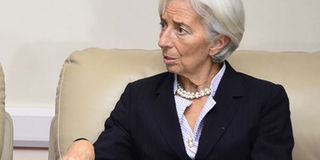IMF downgrades global growth to 3.5 per cent

Ms Christine Lagarde, the IMF managing director. FILE PHOTO BY ALEX ESAGALA
What you need to know:
- The updated World Economic Outlook was released on Monday during the World Economic Forum in Davos, with the IMF warning of weakened global expansion.
- Sub-Saharan Africa, according to the IMF, is expected to grow at 3.5 per cent in 2019 down from 2.9 per cent in 2018 and 3.6 per cent in 2020.
- Ms Christine Lagarde, the IMF managing director, said they were announcing a further downgrade from the one of October that had been informed by negative effects of rising trade barriers, noting that the world economy had after two years of rapid expansion, been growing slowly than expected.
The International Monetary Fund (IMF) has revised global economic growth downwards to 3.5 per cent from an earlier forecast of 3.7 per cent for 2019.
The revision was informed by escalating trade tensions, tight financial conditions, pending withdrawal of UK from the European Union and slowdown in China’s economic growth.
The updated World Economic Outlook was released on Monday during the World Economic Forum in Davos, with the IMF warning of weakened global expansion.
Sub-Saharan Africa, according to the IMF, is expected to grow at 3.5 per cent in 2019 down from 2.9 per cent in 2018 and 3.6 per cent in 2020.
Ms Christine Lagarde, the IMF managing director, said they were announcing a further downgrade from the one of October that had been informed by negative effects of rising trade barriers, noting that the world economy had after two years of rapid expansion, been growing slowly than expected.
This, she said, has resulted from increasing debt, advising that reducing government debt should be a priority as it would open up the space needed to fight future downturns.
Raising debt, especially, across Africa has been a concern with experts noting that some countries were borrowing what they cannot pay.
This, Ms Lagarde said, will need developing macro-prudential toolkits to help further financial sector stability, adding that “there was need for economic reforms to lift growth, especially in labour markets and infrastructure investment.”
The global growth forecast for 2019 and 2020 had already been revised downward in the last World Economic Outlook report, partly because of the negative effects of tariff increases enacted in the US and China.




